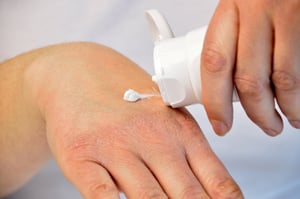Healthcare providers from acute care, primary care, surgery centers and more have a duty and responsibility to protect their patients through the practice of hand hygiene. Patients are at risk of getting an infection while being treated for something else. Healthcare-associated infections affect about one in 31 hospital patients. Healthcare...
Winter Skin and Wound Care
Winter is here and with it comes the coldest temperatures of the year. As winter settles in and everyone recuperates from the busy holiday season, we also look forward to enjoyable seasonal activities from snowball fights to skiing, sledding and more. It’s also the time of year that we find ourselves spending more time indoors with the heat up, drying out the air and our skin.
With drier air in winter months, caused by a lack of humidity, everyone encounters problems with winter skin dryness. Lower temperatures are hard on all skin types, causing the top layer of skin to dry out and become ashy, flaky, chapped or cracked causing chapped lips, nosebleeds and more. Winter weather brings new challenges for healthcare providers and patients. This dry air can also irritate sinuses and cause further troubles for cold and flu sufferers.
Hand Hygiene
All patients are at risk of getting an infection while being treated for something else. Healthcare-associated infections affect about one in 31 hospital patients. Good hand hygiene is a simple and effective way to prevent the spread of germs in healthcare settings such as hospitals, nursing homes and long term care facilities.
However, maintaining hand hygiene practices in winter months comes with a side effect; dry skin. Healthcare providers are, or should be, washing their hands more often than others, sometimes as much as 100 washes within a 12-hour shift. But frequent hand washing with sanitizers and soaps can increase the dryness of skin. One way to combat this is through the use of gentle hand soaps with added moisturizers.
Winter Skin

There are a number of ways healthcare providers and patients alike can combat dry winter skin. Start by employing the use of a humidifier to release moisture into the air. Cutting showers shorter and reducing the water temperature can also help prevent dry skin. Hot showers can strip skin of natural oils so opt for warm showers instead. Also, using a good moisturizer after showers and hand-washing will help lock in moisture all day or all night. Additionally, make sure to stay hydrated by drinking plenty of water throughout the day.
Winter Wounds
Winter weather can also affect wounds in a variety of ways. Colder temperatures can slow blood flow, which is important for the wound healing process. Poor circulation prevents oxygenation of a wound site and inhibits tissue regeneration. Therefore, colder temperatures affect how patients need to care for wounds, including proper drainage using flexible, clinically effective dressings.
Consequently, winter also runs parallel to cold and flu season. Open wounds are susceptible to infection while immune systems focus on attacking and fighting off other pathogenic organisms and viruses. Catching a cold or the flu can also redirect your immune system away from healing wounds.
Concordance partners with suppliers who are experts in skin and wound care in winter and throughout the year. Contact us for more information and to stock up on winter weather skin and wound products today.
Helping you stay in the know
Nearly 30 million children and teens play in an organized sport in the U.S. which leads nearly 3.5 million of those young athletes to injury each year. Student sports injuries account for almost one-third of all injuries incurred in childhood. Typically, the most common related injuries are sprains and strains with some sports, such as contact...
Can you name the last five things you touched? How about the last ten things? It's easy to lose track throughout the day of all the objects and surfaces we come in contact with. What's worse is most of these items have had hundreds, if not thousands of other people touch them as well. Keeping hands clean is an important step to avoid getting sick...




